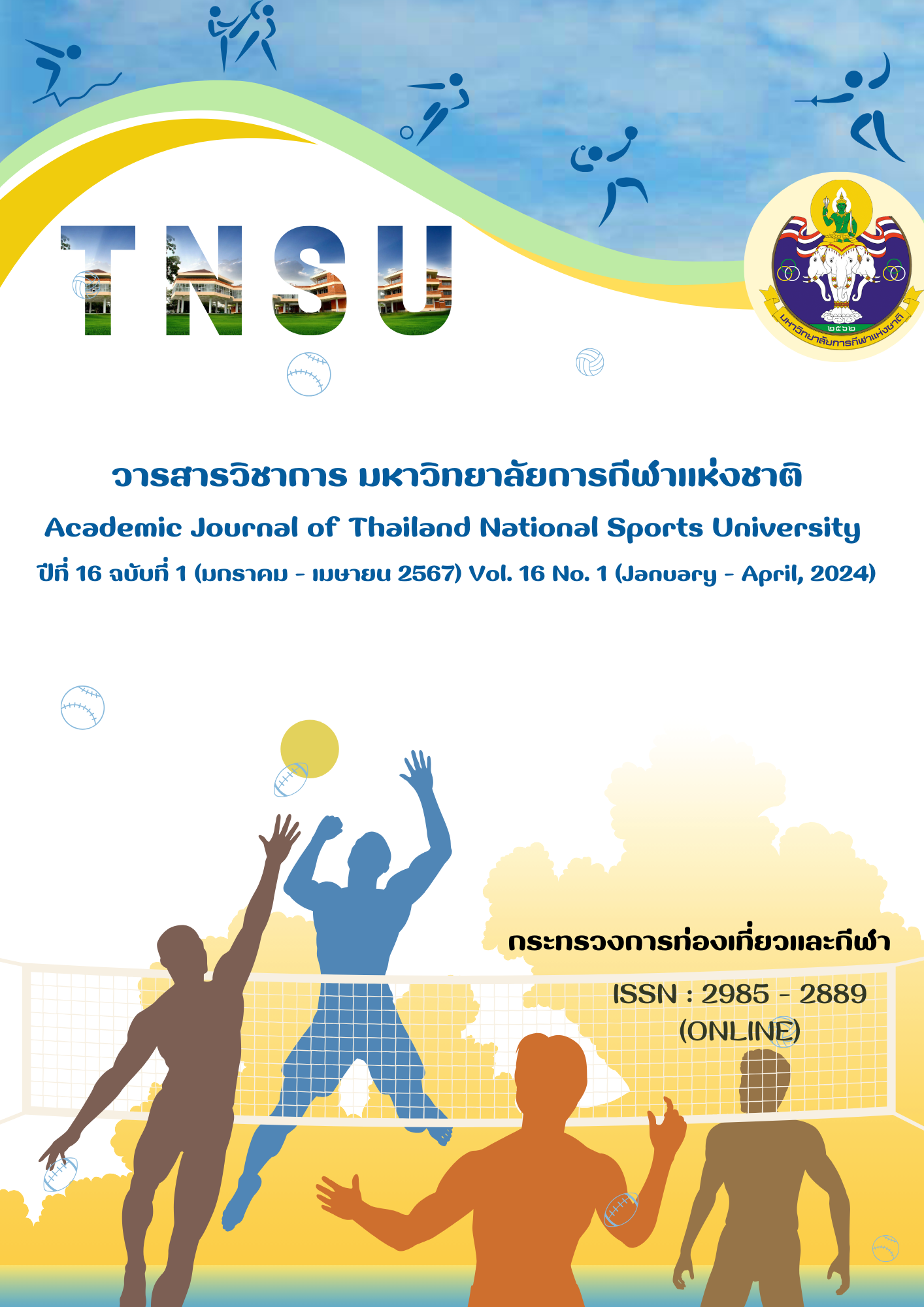A STUDY OF THE PERCEPTIONS AND EXPECTATIONS OF STAKEHOLDERS TOWARDS IN SPORTS MANAGEMENT INTERNSHIP UNDER THE COVID 19 SITUATION FACULTY OF LIBERAL ARTS THAILAND NATIONAL SPORTS UNIVERSITY, SOUTHERN REGIONS
Main Article Content
Abstract
The research aimed to study the perceptions and expectations of stakeholders towards in sports management internship under the Covid 19 situation Faculty of Liberal Arts Thailand National Sports University, Southern Regions. The data collected had been divided into two phases: the first phase included 36 people who were instructors and entrepreneurs doing online group discussion, the second group was 54 of the fourth-year students in sport management program doing online questionnaire. The results were the perceptions of stakeholders towards internship students were 1) applied principles, concepts, theories to increase professional,
2) working with others under responsibilities, honest, initiative, creativity with job development, 3) being able to analyze thinking, research and integrated knowledge to increase work efficiency and 4) using technology appropriately.
The actual perception that students expect was listening and speaking skills, got knowledge according to internship, professional experience and invent sports innovations, Photoshop program, searching the information with technology, operating with responsibilities, honest, integrity, initiative, morality, ethics and common sense, as well as having a good personality, good manners and respect discipline and social rules. In summary, the two groups of stakeholders had perceptions and expectations of the field experience learning outcomes standard in 4 aspects; ability to apply the principles, concepts, theories, ability to analyze thinking, research and integrate, ability to use technology, human relations and responsibility. It was higher than perceived and they didn’t expect for the field experience learning outcomes standards. The results will be as guideline for relevant both internal and external organizations in the current situation and curriculum development according to learning outcome of the Higher Education Qualification Standards 2022.
Article Details

This work is licensed under a Creative Commons Attribution-NonCommercial-NoDerivatives 4.0 International License.
The published article is a copyright of the Academic Journal of Thailand National Sports University. The passage appeared in each article in this academic journal is a perspective of each author which is not related to the journal. Each author is required to be responsible for all components of his/her own article. If there are any mistakes, each author must be responsible for those mistakes on his/her own.
References
students, Faculty of Humanities and Social Sciences Prince of Songkhla University. Journal of Academic Resources, Prince of Songkla University, 28(2), 184 – 194.
Chapleo, C., & Simms, C. (2010). Stakeholder analysis in higher education, perspectives: Policy and practice in higher education. Perspectives: Policy and Practice in Higher Education, 14(1), 12 - 20.
Department of Disease Control, Ministry of Public Health. (2020). Coronavirus disease 2019 (COVID - 19). Retrieved from https://ddc.moph.go.th/viralpneumonia/int_ protection.php
Jorge, M. L., Hernández, A. L., & Cejas, M. Y. C. (2012). Stakeholder expectations in Spanish public universities: An empirical study. International Journal of Humanities and Social Science, 2(10), 88 - 108.
Krejcie, R. V. & Morgan, D. W. (1970). Determining sample size for research activities. Educational and Psychological Measurement, 30(3), 607 - 610.
Leedy, P. D., & Ormrod, J. E. (2015). Practical research: Planning and design (11th ed.). Boston: Pearson.
Lee, H. C., Naziha, B. Y., Quek, L. S., & Ang, Y. Y. (2014). Internship experience: An in - depth interview among interns at a business school of a Malaysian private higher learning institution. Procedia - Social and Behavioral Sciences, 123, 333 – 343.
Nyumba, T. O., Wilson, K., Derrick, C. J., & Mukherjee N. (2018). The use of focus group discussion methodology: Insights from two decades of application in conservation. Methods in Ecology and Evolution, 9, 20 - 32. doi: 10.1111/2041-210X.12860.
Pannee Kitwattana. (2011). Strategic relationship modeling of course learning through the Internet. Research report. Faculty of Education, King Mongkut's Institute of Technology Ladkrabang soldier.
Penpaksina Wichienwan, & Rungpetch Panngam. (2018). Stakeholders' perceptions and expectations towards the cooperation project sending internship students of the bachelor of arts program hotel business program Suan Dusit University. Journal of Dusit Thani College, 12(3), 201 - 218.
Sudarat Chanput. (2016). Expectations and satisfactions of graduate students on the quality of services of the graduate school Silpakorn University (Master’s thesis), Silpakorn University.
Thailand National Sports University. (2020). Bachelor of business administration program sports management (revised edition 2020). Faculty of Liberal Arts Thailand National Sports University Yala Campus Ministry of Tourism and Sports.
Thailand National Sports University Announcement. (2020). Measurement for prevention and control coronavirus disease 2019. Thailand National Sports University Ministry of Tourism and Sports.
Thitirat Muenanan. (2020). Guidelines for organizing learning experience for interior design cooperative education courses under the situation of COVID-19. In SPU Educational Transformation to the New Normal Academic Conference. (pp.284 – 295). Retrieved from http://dspace.spu.ac.th/handle/123456789/7016
UNESCO. (2020). Distance learning solutions. Retrieved from https://www.en.unesco.org/ covid19/educationresponse/Solutions
Yada Chawankul, Nopakamol Chana, & Latthaporn Chanthonglang. (2018). Stakeholder needs towards desirable characteristics of a master's degree program, master of architecture department of industrial design. Journal of Art and Architecture, Naresuan University, 9(1), 169 - 176.


